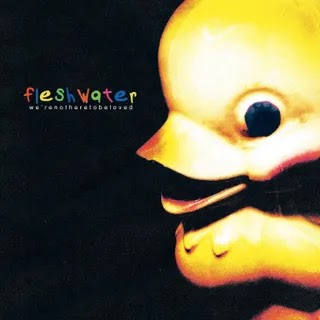On the Vein.fm side project’s full-length debut, these hardcore musicians melt down an entire CD binder’s worth of alt-rock classics and sculpt an alternate timeline out of the pliable remnants.
We’re suddenly in a world where every hardcore band can emulate the styles and sounds that only the most privileged of their 1990s forebears could afford: the Butch Vig crunch, the Ross Robinson bite, the Flood/Alan Moulder atmosphere. Former scrappy upstarts Turnstile and Code Orange have garnered Grammy nominations for their populist alt-rock and glitchy metalcore, respectively. And while Vein.fm maintain a caustic quality that excludes them from the heights of their former tourmates, their nü-metal-tinged sound has found an audience among DIY crowds that might’ve once disparaged that maligned genre’s flashy signifiers.
Less than two years after the Massachusetts group’s 2018 breakout, Errorzone, they unceremoniously dumped a demo by a side project called Fleshwater onto their social media accounts. Compared to their primary project, these three rough-hewn but impressive songs were sexier, more melodic, and choosier about flashing their hardcore credentials in service of brutal beatdowns. The methodical back half of Vein’s pandemic-delayed 2022 follow-up, This World Is Going to Ruin You, suggested spillover between the projects. But even after the Fleshwater demo and Vein’s recent album, the sleek beast that is We’re Not Here to Be Loved shatters expectations.
The demo definitely had songs—hooky, kinetic compositions that went far beyond snoozy “hardcore band goes shoegaze” stereotypes—but it lacked the crisp precision that the style demands. For We’re Not Here to Be Loved, the group enlisted Converge guitarist Kurt Ballou to record and mix. Fleshwater—which consists of Vein members Anthony DiDio, Jeremy Martin, and Matt Wood alongside singer/guitarist Marisa Shirar—prove themselves capable of mimicking eclectic ‘90s influences at a mile a minute. Paired with Ballou, they form a too-big-to-fail braintrust among a sea of likeminded hardcore castoffs.
Play a random five-second clip of We’re Not Here to Be Loved and you can spot the touchstones. Opener “Baldpate Driver” immediately shoves Hum and Deftones’ hi-sheen shoegaze down your throat. “The Razor’s Apple” is a mini-symphony of anthemic riffs that recall both Thrice and “Everlong.” The one demo holdover, “Linda Claire,” boasts a grungy strut that sounds impossible to play without a bass slung as low as Krist Novoselic’s. Every young rock band apes the ‘90s now. Yawn. Fleshwater melt down an entire CD binder’s worth of classics and sculpt an alternate timeline out of the pliable remnants.
With their basements-to-breakbeats trajectory, Vein have made it clear they are uninterested in the boundaries of bygone scenes. That mindset carries over to We’re Not Here to Be Loved, rendering it an alt-rock playground where rock-radio power chords leech momentum from squeals of feedback, blastbeats punctuate the half-time choruses, and a bold cover of Post’s “Enjoy” bolsters the theory that Björk could’ve been the queen of nü-metal, had she wanted to. The range of influences might be limited to a specific era, and Fleshwater are anything but “genre-mashers,” but they’re such exacting synthesists that their innate hardcore energy wrings new life out of these dated-but-trendy sounds.
Where other revivalists’ strengths come from carving a niche, Fleshwater’s execution is more quicksilver. Matt Wood, already one of hardcore’s most dizzying drummers, is their slithering backbone, guiding grooves that are thicker than Vein’s but constantly peppered with nimble flashes of his standard breakdowns and blastbeats. And while We’re Not Here to Be Loved doesn’t quite reach its influences’ big-budget collage of guitar tones, DiDio and Shirar explore the fertile territory between gnarled distortion and digitized glassiness with Ballou ensuring that all of it explodes out of the speakers.
If there’s one thing that sets the album apart, it’s the uninhibited vocal approach. DiDio is a solid supporting actor, his close-mic’d mumbles providing the moody songs with a necessary glumness, but he’s really here to complement Shirar. She flat-out goes for it in a way that’s rare among modern grunge and shoegaze bands. Try to imagine how the gripping first line of the song “Closet”—“I’m sorry for the things I can’t undo”—would sound with someone half-assedly moaning it. On the album’s most anthemic cuts, like “The Razor’s Apple” and “Kiss the Ladder,” she wails like Diary-era Jeremy Enigk, sharing the Sunny Day Real Estate frontman’s fondness for fragile, descending melodies and his ability to imbue them with pain and passion. On the songs where DiDio takes centerstage, Shirar opts for more of a sun-coming-through-the-trees shoegaze keen, which she also nails, but Fleshwater are never more invigorating than when she’s in the spotlight.
We’re Not Here to Be Loved is a great reminder that ‘90s bands’ success usually had more to do with their frontperson than their producer. Now that the playing field between four-track recorders and million-dollar soundboards has been considerably leveled, the gap between contemporaries more often concerns charisma. With a deft ability to blend influences, a formidable roster of hardcore-trained musicians, and a singer who doesn’t fade into the background, Fleshwater bound ahead of their peers by making the familiar exciting again.



0 comments:
Post a Comment